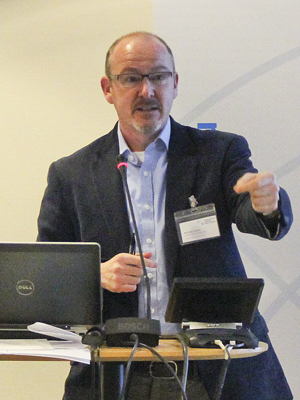In the media
WIDERAngle blog featured on Development Ideas - Can extractive industries promote development?
"I spent the last couple of days at a fascinating workshop at UNU-WIDER on the role of extractive industries in development. Tony Addison, UNU-WIDER Chief Economist-Deputy Director, and Alan Roe, UNU-WIDER Non-Resident Senior Research Fellow and Oxford Policy Management Associate are pulling together a comprehensive new book on the topic, including chapters on just about every aspect of the relationship between extractives industries and development that you can imagine (and several I hadn’t)."

Neil McCulloch's blog post reflecting discussions and summarizing six key take-aways from a recent project meeting 'Extractive industries and development' was replicated on 'Development Ideas', a website for development thinkers and practitioners to share ideas and debate. McCulloch works as a Principal Consultant at Oxford Policy Management.
The 'Extractive industries and development' meeting in which Neil McCulloch participates was held in Helsinki on 11-12 April 2016. The meeting brought together academics, experts, independent consultants, as well as private and public sector representatives, to discuss how developing countries can avoid the typical macroeconomic problems that are often linked to resource wealth, and how they can use resource revenues transparently for inclusive national development.
Six key take-ways by Neil McCulloch:
- Ability to grow slow is a key factor for successful exploitation of natural resources. Growing slow and applying systematic policies of technological capacity-building over an extended period of time. However, for many developing countries this seems nearly an impossibility.
- Successful Wealth Fund models from developed countries do not necessarily work in developing countries. Although Wealth Fund models such as Norway's SWF model are often set as examples for developing countries, it is almost impossible for them to set aside a large pot of money and not raid it to immediate needs.
- New resource finds can put macroeconomic stability into difficulties. Upon finding rather modest quantities of oil, Ghana went on a major spending spree. As a result, the country is paying far more in interest payments than it generates in oil revenue. Ghana's case suggests new resource finds can alter political incentives.
- Fracklogs. Backlog of wells which have been drilled or prepared already for shale oil but which are not producing because of the low price of oil. If the oil prices rise to a ceiling level, these wells will rapidly come into production stabilizing the price.
- Race to burn unburnable carbon. Whilst energy efficiency and renewables may be stabilizing the growth of energy use in rich countries, the relentless demand for energy from developing countries begs the question ‘whose carbon gets burned first?’
- Views on mining are matters of the heart. Mining affect communities and people. Promoting meaningful dialogue between communities and mining companies will help to minimize social conflict as well as maximize the companies contribution towards sustainable development.
Research to inform policy
The meeting was part of UNU-WIDER’s research project Extractives for development which connects actors from multiple fields to produce an authoritative overview on how to better use the extraction of oil, gas, and minerals for development and poverty reduction. The research will culminate in a book that consolidates the diverse perspectives on the topic within a single framework.
Read the article on Development Ideas
Neil McCulloch's article 'Can extractive industries promote development?' was originally published on our WIDERAngle blog in May 2016.
 Join the network
Join the network